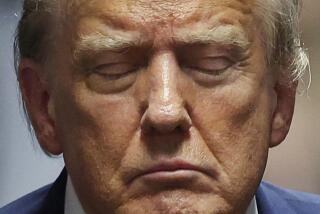New Judge Lays Down the Law in Hussein Trial
BAGHDAD — A tough new chief judge imposed order Sunday on Saddam Hussein’s chaotic trial, ousting a co-defendant and a defense attorney from the courtroom and provoking a walkout by the rest of the defense team. Shouting “Shame on you!” the deposed Iraqi leader then refused court-appointed counsel and was escorted out, followed by two more co-defendants who joined him in protest.
Insults, profanity, shouting matches, shoving and gavel-pounding consumed the session’s first half-hour before a visibly agitated Judge Raouf Rasheed Abdel Rahman gained control. The trial proceeded without four of the eight defendants and any of their original 13 lawyers.
The trial, in its eighth session Sunday, has been beset by procedural delays, repeated outbursts by defendants, the killings of two defense lawyers and a shake-up that has given the five-member trial panel three chief judges in as many weeks.
Abdel Rahman’s assertive tactics at the beginning paved the way for three hours of uninterrupted testimony by alleged victims of the deposed regime.
“There’s a new sheriff in town,” said Michael P. Scharf, a Case Western Reserve University law professor who helped train the Iraqi trial judges. “I think we witnessed a turning point in the Saddam trial today.”
But other legal observers said the judge’s decision to continue without the best-known defendants and their lawyers raised questions about the fairness of the trial and the viability of the U.S.-created tribunal.
“In the face of provocative outbursts, the judge has to be firm but not trigger-happy in applying sanctions if fairness is going to be respected,” said Richard Dicker, director of international justice for New York-based Human Rights Watch, which had opposed holding the trial in Iraq.
Miranda Sissons, observing the proceedings for the International Center for Transitional Justice, another New York-based group, said she had “sympathy for the judge’s effort to control the courtroom” but worried about his threat to continue the trial of defendants in absentia. “We hope this situation is temporary,” she said.
Before the defense lawyers walked out, the judge warned them twice they would not be allowed to return. After they left, he brought in six court-appointed attorneys to replace them for the rest of the trial.
After the session, however, chief investigator Raid Juhi said the defense lawyers could appeal to return to the courtroom. He said Hussein and the three defendants who left with him could also come back if they promised to “behave in the proper way.”
The trial was adjourned until Wednesday.
Since the trial began in October, the court has struggled to maintain a balance between fairness to the defendants and a determination to overcome their delaying tactics and anti-U.S. diatribes.
The first chief judge, Rizgar Mohammed Amin, had been criticized by the Iraqi government for allowing defendants’ outbursts to dominate previous sessions. With both sides eager to test each other, Abdel Rahman opened Sunday’s session, the first in more than a month, with a pledge to be stricter.
Frowning down from the bench, the 64-year-old judge warned that he would permit no “political speeches” and threatened to expel any defendants “who cross the line.”
Barzan Ibrahim Hasan, Hussein’s half brother, former chief of intelligence and fellow courtroom rabble-rouser, quickly challenged the jurist.
“Circumstances have forced us to deal with each other here, in spite of my belief that this tribunal is illegitimate,” he said, repeating a defense argument that the court is a tool of the U.S.
“What is your point?” the judge interjected, leaning forward and squinting.
“I said this court is a bastard child,” Hasan shot back.
In the ensuing uproar, the judge was heard shouting, “Correct your vocabulary!” Gesturing wildly, he ordered Hasan to sit.
When Hasan refused, three bailiffs grabbed him by the arms and hauled him away, his feet dragging along the floor.
The expulsion stunned a courtroom and a nation that had become accustomed to little action in the face of outbursts.
Leaders of the Shiite Muslim alliance that heads Iraq’s government applauded the new judge. They had accused the court of becoming a vehicle for Hussein, who remains a rallying figure for some in the Sunni Arab-dominated insurgency.
The defendants are charged in the deaths of more than 140 residents of Dujayl, a Shiite village. The killings were an apparent reprisal for a 1982 assassination attempt against Hussein.
“The trial is back on track,” said Jawad Bolani, a Shiite member of parliament. “The judge’s firmness will shorten these proceedings and facilitate the convictions and death penalty that Iraqis expect.”
At the defense counsel’s table, Hasan’s ouster set off a boisterous protest. Nearly everyone in the courtroom rose to join the shouting match. The judge banged his gavel to no effect.
“Is this a street demonstration?” he barked. “Are you lawyers?”
Watching the chaos on television at home, former chief judge Amin told Associated Press: “I am happy that I am no longer part of this trial.”
In the courtroom, Judge Abdel Rahman, after evicting Hasan, also ordered bailiffs to remove Jordanian defense lawyer Salih Armouti.
“You have incited your clients, and we will start criminal proceedings against you,” said the enraged judge. Armouti put up a struggle, shouting as he left.
The rest of the defense team started to walk out in protest. A similar threat by the defense, on Dec. 5, led to a recess and concessions. As they headed for the door this time, however, Abdel Rahman made it clear that the trial would go on without them.
The judge also cut off the delayed television feed during Hasan’s diatribe, his expulsion, and the lawyers’ walkout. TV viewers, who follow the trial closely in Iraq and the Arab world, got their picture back in time for Hussein’s theatrical exit.
As the court-appointed defense lawyers entered, Hussein stood to protest. Guards pushed him back into his chair, but he persisted. “You are evil if you stay here,” he told the lawyers.
Then Hussein asked to leave the courtroom, setting off more sparring with the judge.
“If you want to leave, I am having you removed,” Abdel Rahman said.
“Shame on you.... You are an Iraqi,” the 68-year-old Hussein said, wagging a finger and speaking as if he were still president. “You cannot say to your leader that you are throwing him out of the courtroom.”
“I am the judge and you are the defendant,” Abdel Rahman said. “I am enforcing the law.”
Two guards were ordered to lead Hussein out. Casting scornful glances in all directions, he walked slowly with the guards close on either side but not touching him.
He was followed by his former vice president, Taha Yassin Ramadan, and Awad Hamed Bandar, former chief of his Revolutionary Court.
That left four minor officials of Hussein’s Baath Party in court; they protested the appointment of the new lawyers but otherwise sat submissively.
Three witnesses, two women and a man, testified from behind a curtain to conceal their identities. They described how they had been arrested in Dujayl after the assassination attempt, watched other detainees die from torture, and survived a desert prison camp. All were freed after four years’ captivity.
The first witness said her interrogators removed her head scarf and gave her electric shocks. “I thought my eyes would pop out,” she said.
The second witness sobbed as she told of seeing a blind girl tortured. Both women said they’d been forced to stand for long periods on one leg and were beaten if they put the other leg down.
Defendants who remained in the courtroom were allowed to raise questions about their testimony, and two of them denied being involved in the arrests. But the court-appointed defense lawyers did not cross-examine the witnesses, a fact noted by independent observers who question the fairness of the trial.
More to Read
Sign up for Essential California
The most important California stories and recommendations in your inbox every morning.
You may occasionally receive promotional content from the Los Angeles Times.










